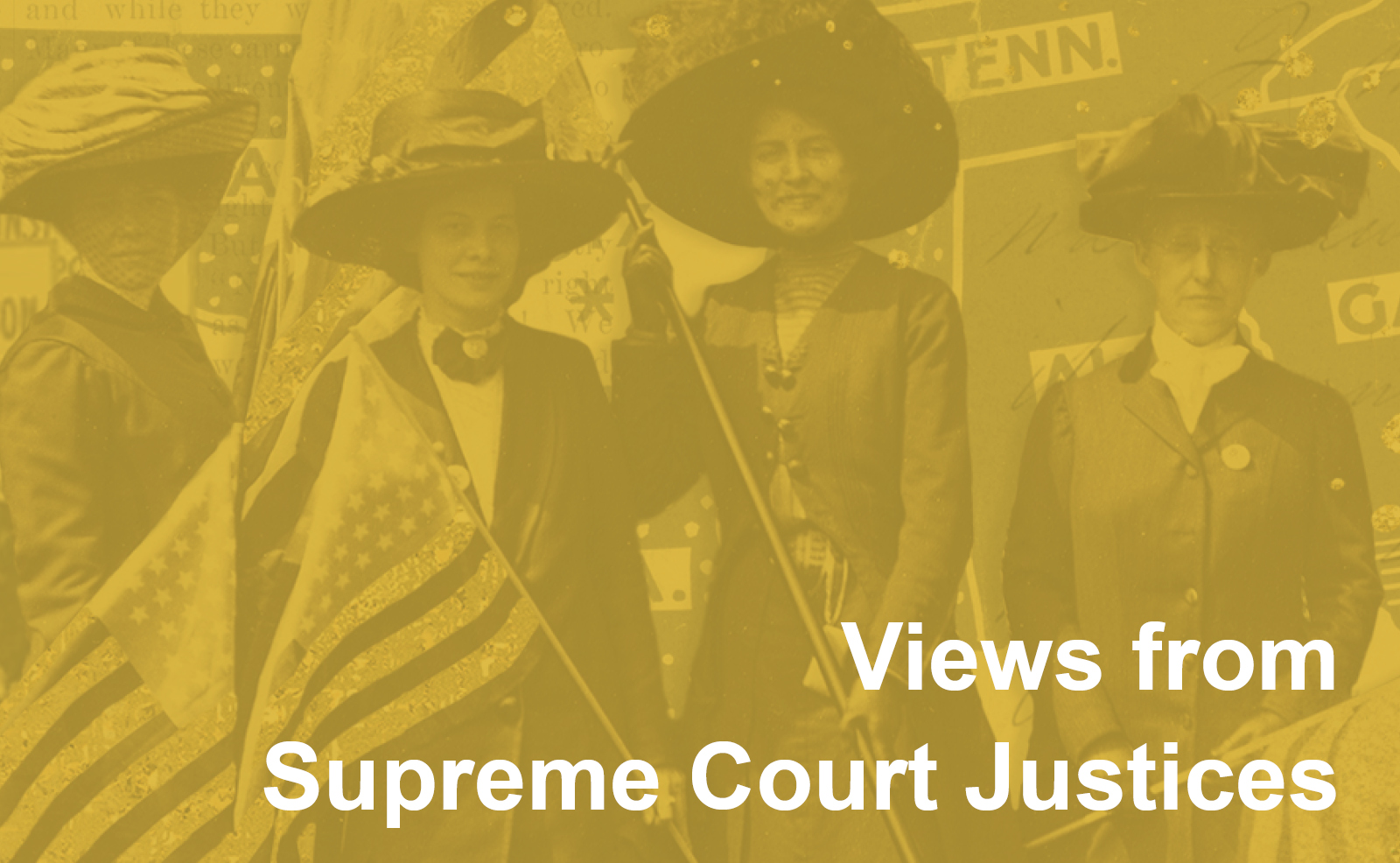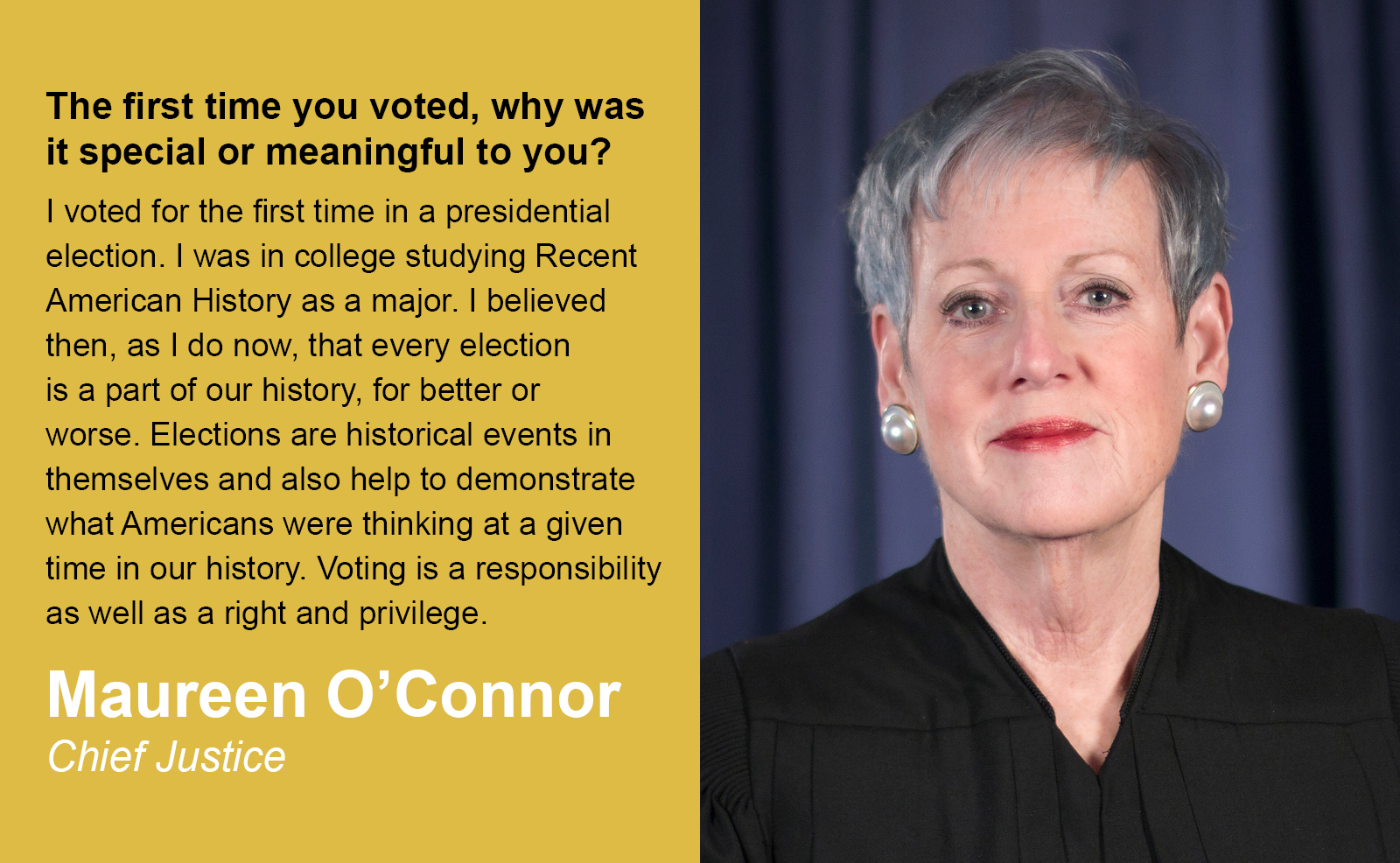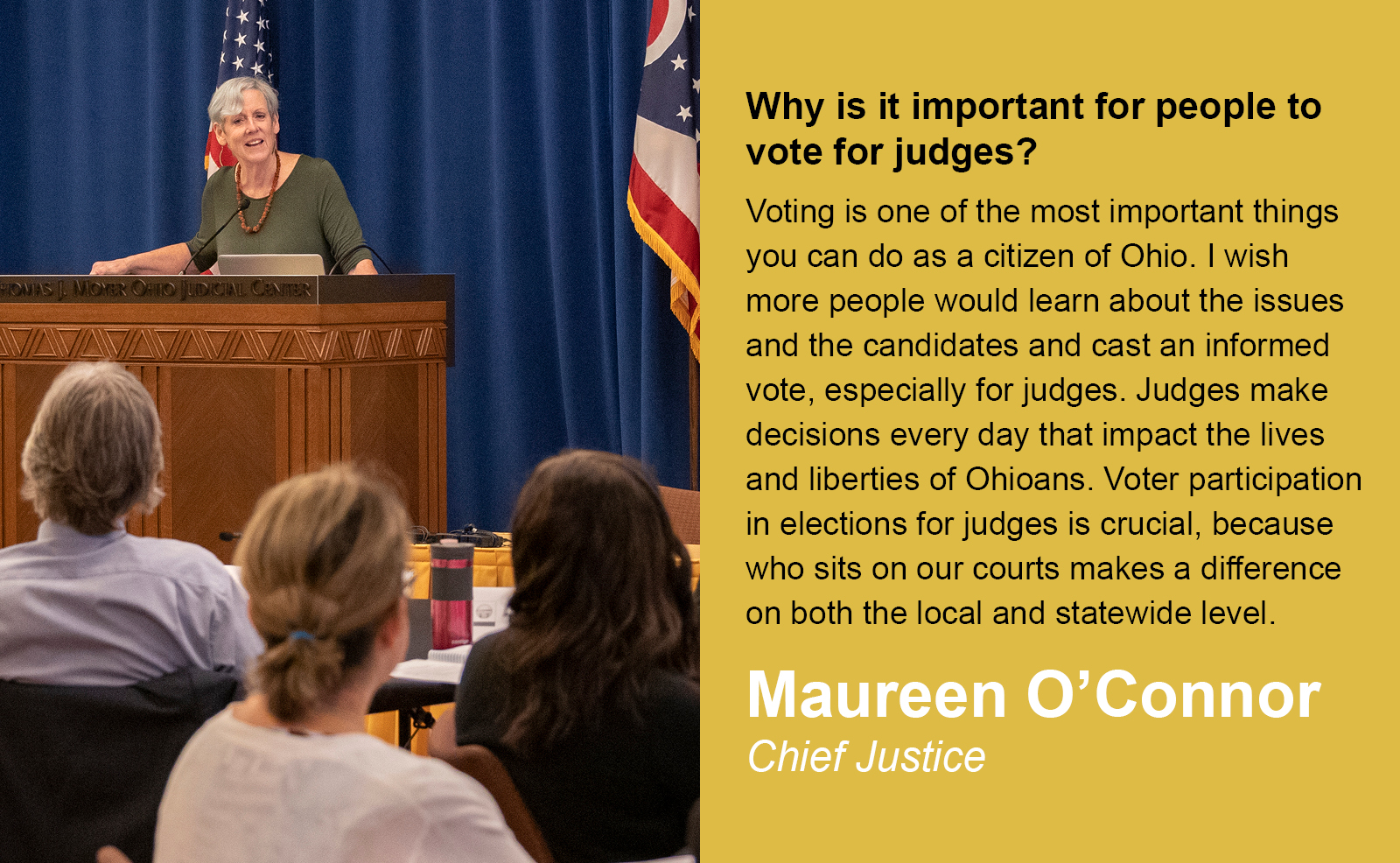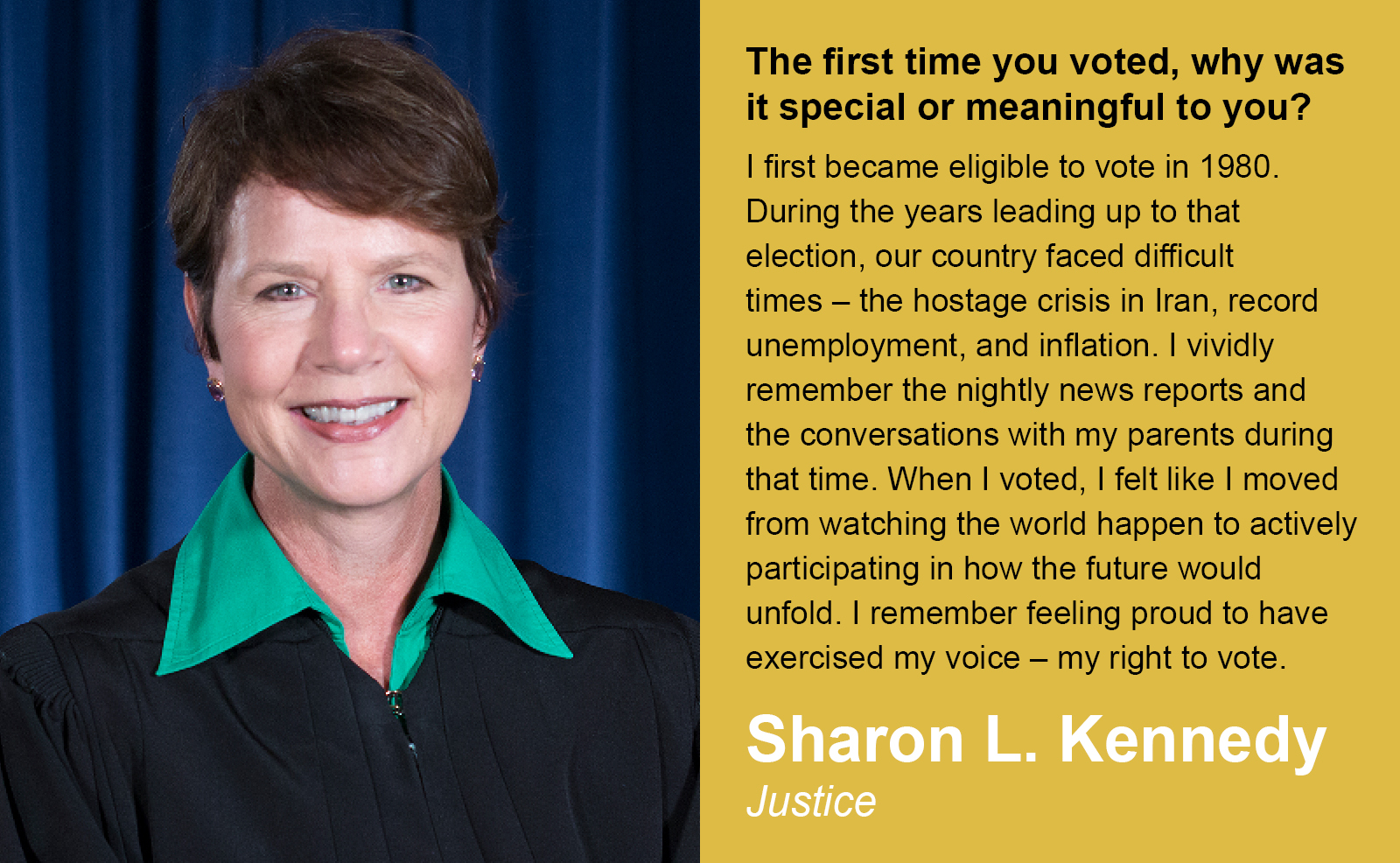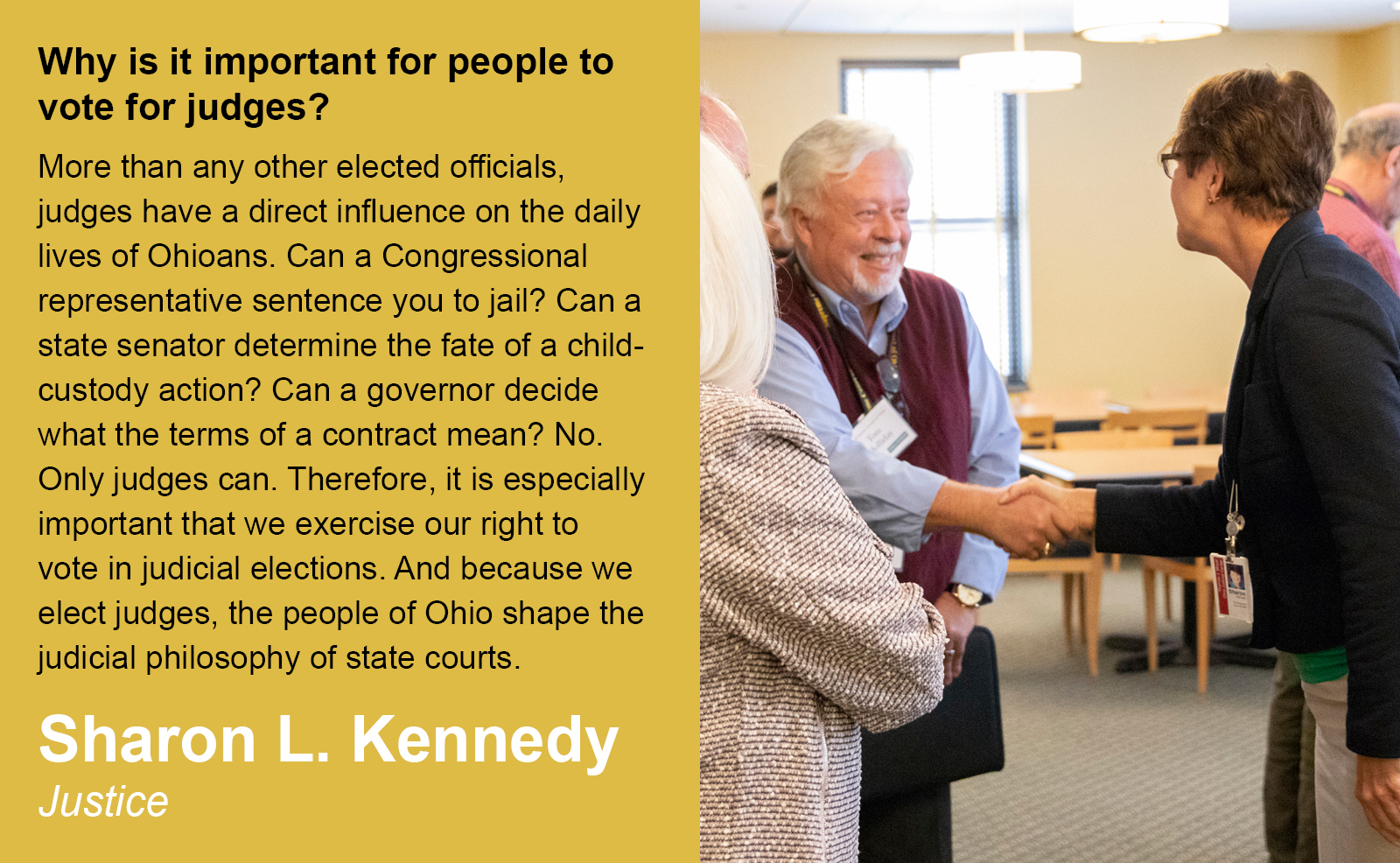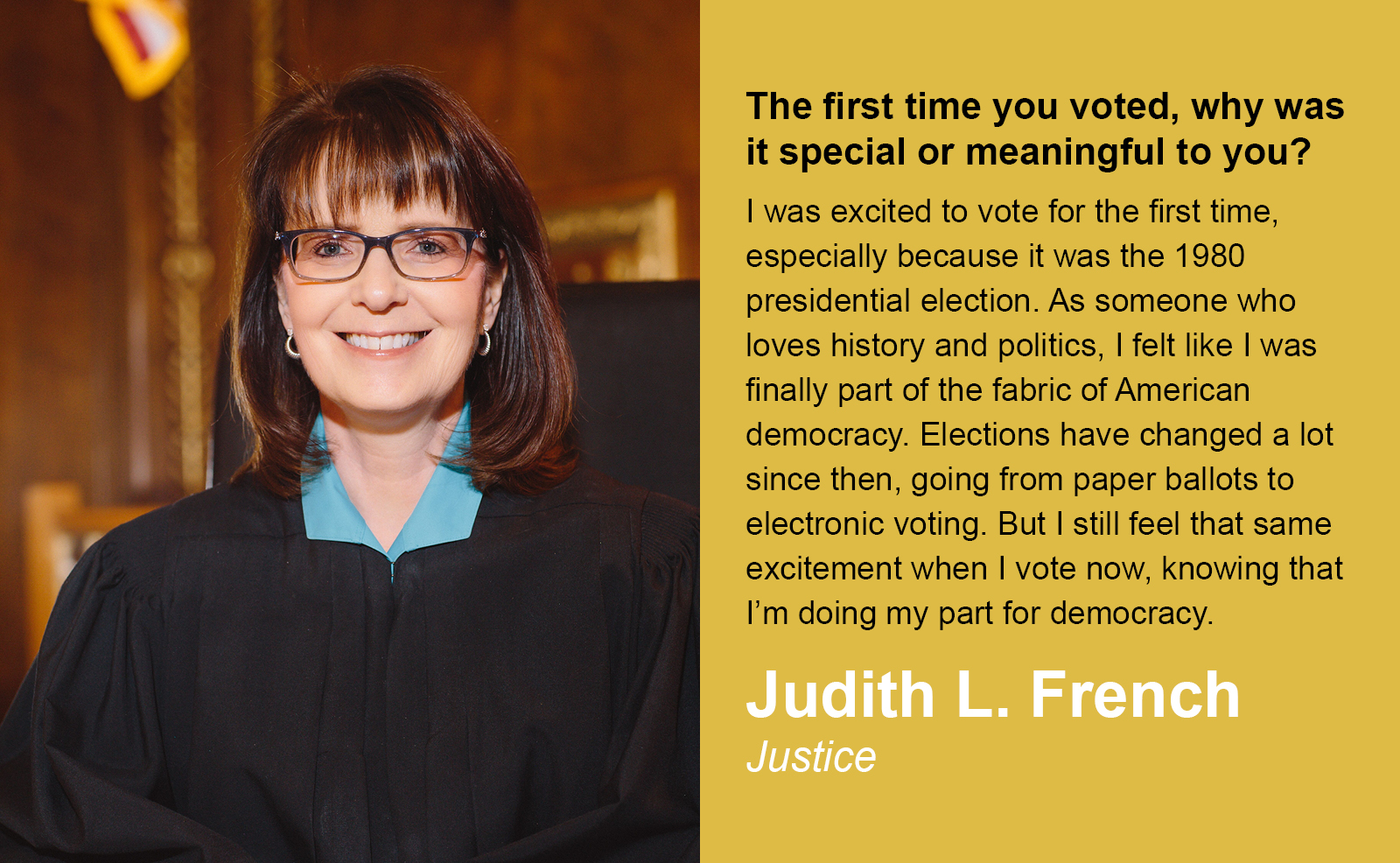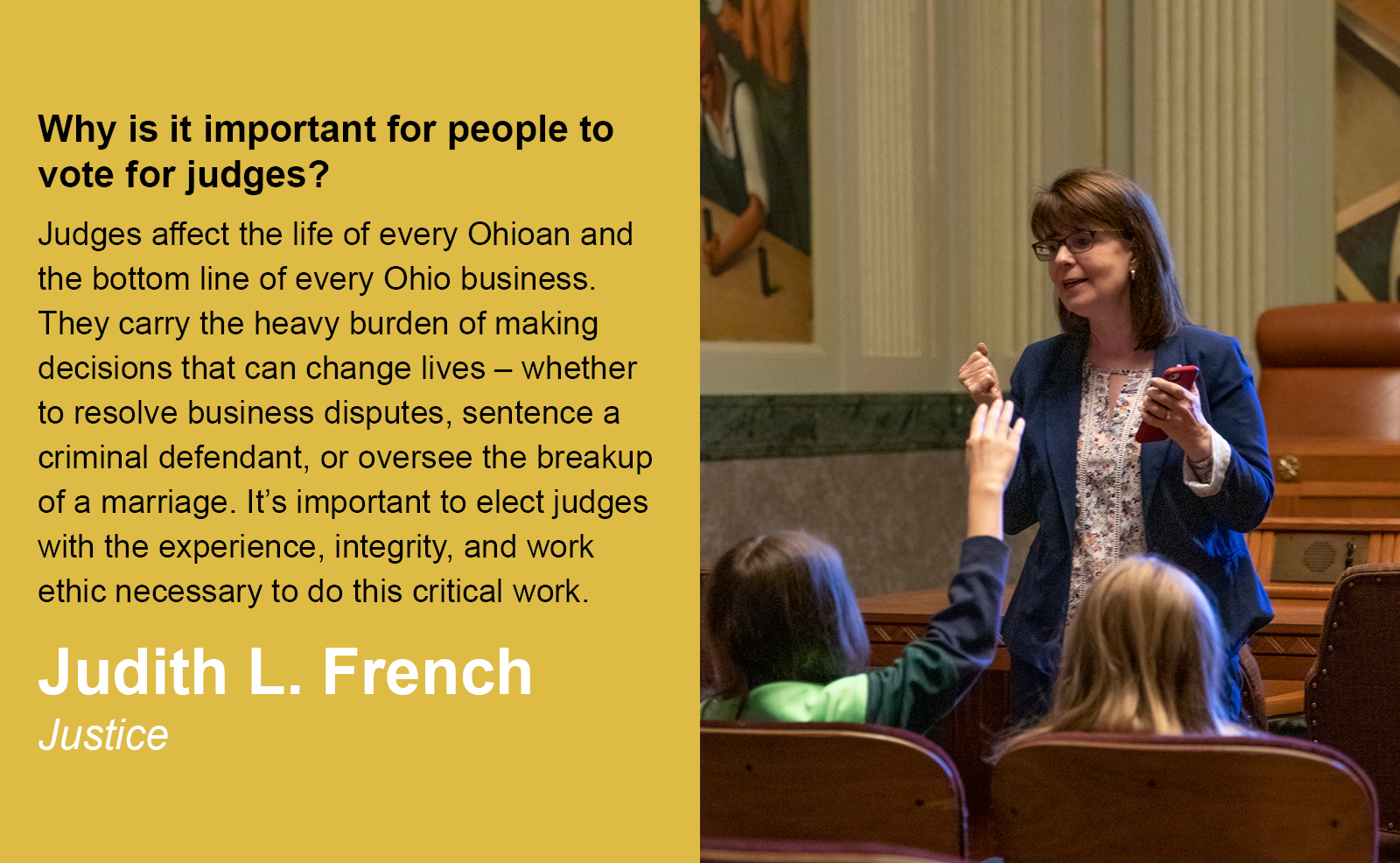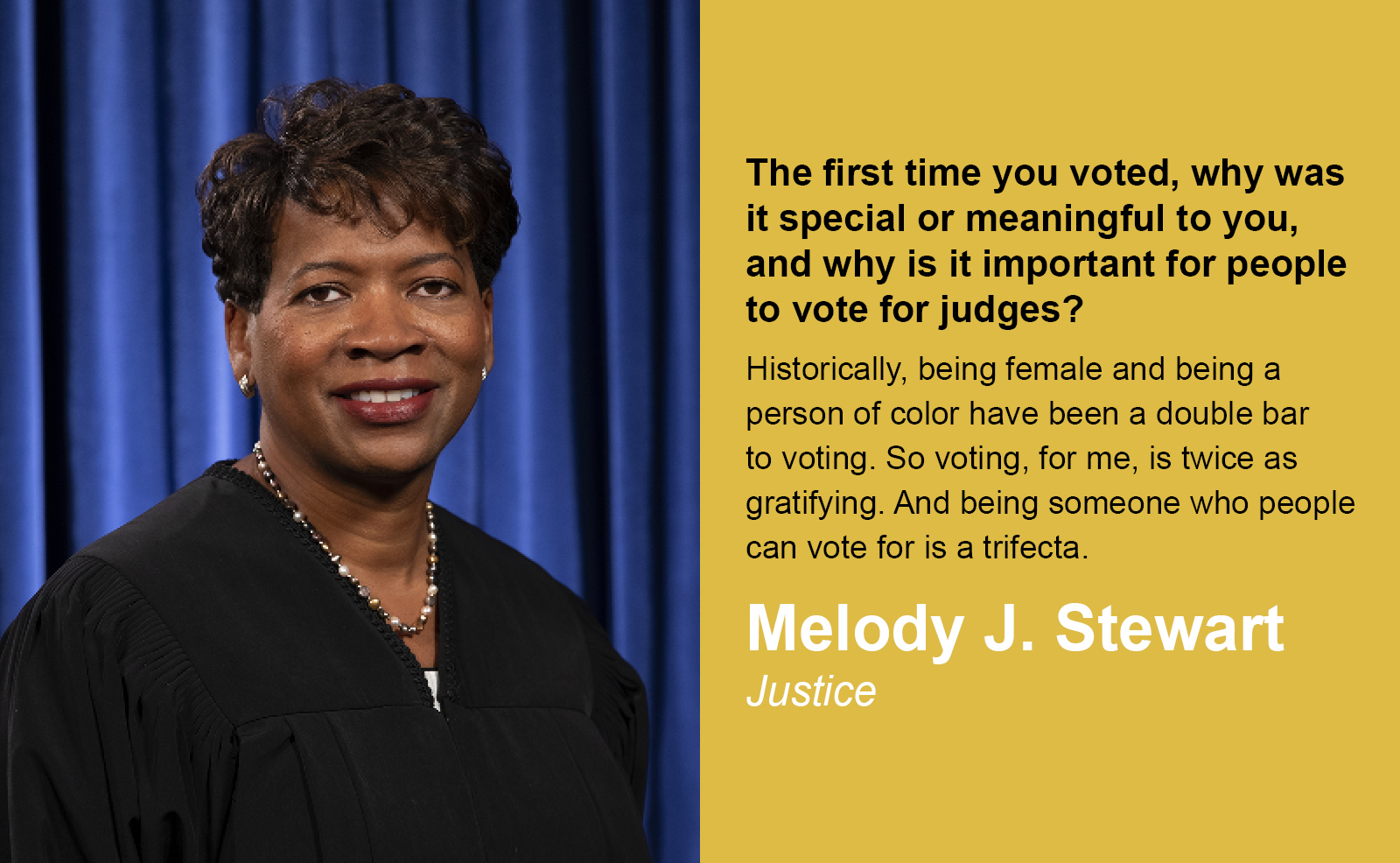A More Perfect Union
The U.S. Constitution begins with the words, “We the people.” Yet women fought for decade after decade for the right to participate in electing their leaders. The 19th Amendment finally began making its rounds in 1919, through the states toward ultimate ratification. One hundred years later, Ohio judges and justices share what it has meant to them to participate in democracy’s most basic responsibility – voting.
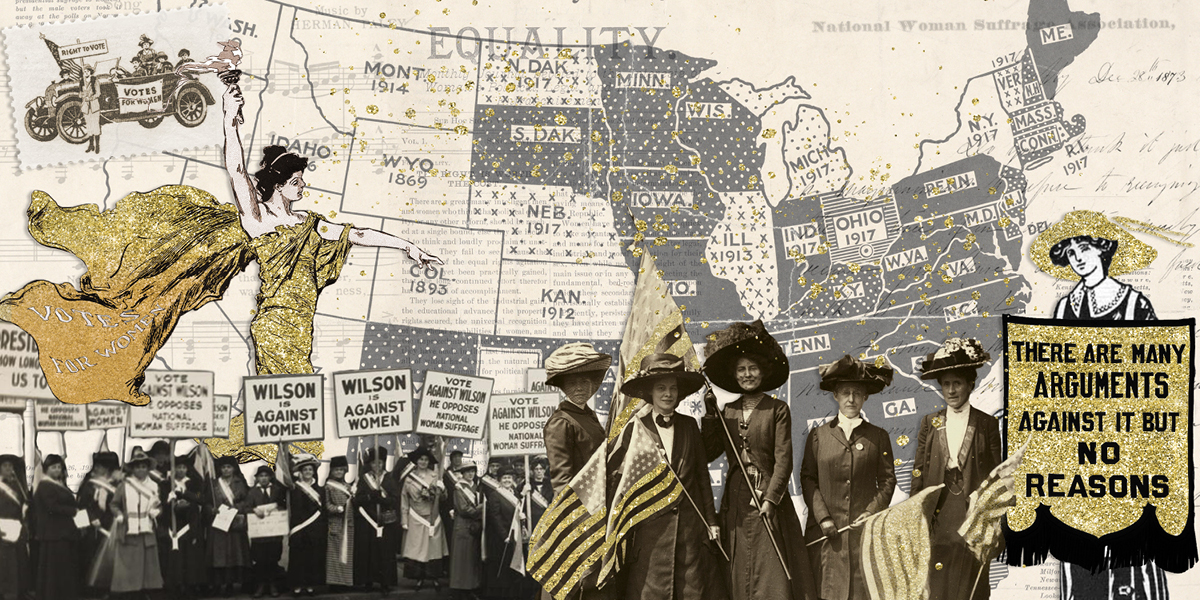
As another Election Day fades away, it’s a reminder of the privilege in this country to select our public officials at the local, state, and national levels. This right wasn’t always widely extended. White males were the only individuals who could vote for many decades. Since at least 1848, though – when the Women’s Rights Convention was held in Seneca Falls, New York, and participants drafted a declaration of rights – women have fought to have a say in who is elected to represent them.
In June 1919, after several failed attempts, Congress proposed the U.S. Constitution’s 19th Amendment to give women the right to vote. The measure traveled to the states for the required ratification. Ohio ratified the amendment swiftly – on June 16, 1919. About a year later, Tennessee’s approval gave the country the 36 states needed to make the amendment part of the U.S. Constitution. (Even so, it took many more years to push back obstacles to voting for African Americans, Asians, and Native Americans.) On Aug. 26, 1920, the U.S. secretary of state formally certified the 19th Amendment.
As part of the national, yearlong celebration to honor the 100th anniversary of women gaining the right to vote, women who serve in Ohio's judicial branch tell what it was like the first time they cast a ballot, what drove them to participate in the electoral process, and how it felt to be a winning candidate in an election.

The first time you voted, what was the experience like?
JUDGE BECKMAN: I remember being nervous the first time I voted. I was nervous because I did not want to look like a fool not knowing what I was doing. At 18 years old, I did not understand the magnitude of the election process at all.
JUDGE ZAYAS (first Hispanic woman elected to an Ohio appellate court): I remember it feeling overwhelming, and wondering if I was doing it correctly.
JUDGE TORRES-LUGO: I was going to elect the mayor of the city where I lived in Puerto Rico. It was so amazing. I was going to be a decisive factor. It felt so important to me, and it was fun.
JUDGE HUFFMAN: It was the 1980 presidential election, and my recollection is I was scared because of the important responsibility that goes with voting. You need to put thought into who you choose; you don’t just click any button.
JUDGE TRAPP: The minute I turned 18, I was so excited to vote. We had debated the voting age in high school, and it hadn’t been that long since 18-year-olds were allowed to vote. To walk in to vote, it was very gratifying. It was an awesome responsibility because people before us didn’t have that right.
JUDGE COOPERRIDER (first female judge in Perry County): My parents had eight children. It was a busy lifestyle. However, my parents always made the time to vote. They lived through wars, depressions, and other significant events in our country. We would always talk about the importance of voting. Government was my favorite class in high school, and our teacher helped us register to vote.

Among her many firsts, Florence E. Allen was the first woman elected to a judicial office in the United States (the Cuyahoga County Common Pleas Court), and the first woman elected to a state supreme court (the Ohio Supreme Court, of course). There’s a move afoot to name Cuyahoga County’s new or refurbished justice center after her to honor her notable achievements. She also became the first woman to serve on a federal appeals court.
JUDGE BALLINGER: I can’t remember the first time that I voted, but I do remember talking to my mom about voting when I was in middle school. She told me that she was of one party and my dad was of another party. This helped me to understand that you don’t hate the opposing party, but rather understand that there are different views and beliefs.
Why did you want to vote? How was voting meaningful to you?
JUDGE HUFFMAN: Our father was an attorney and a county prosecutor. He was very invested in politics but also stressed to my brothers and sister and me the importance in participating in the political process. We all passed out literature for candidates from the time we were about 8 years old, and we heard about elections and politics at every meal. Our father and our uncle, who was also a county prosecutor, always impressed on us that voting isn’t just a right, but an important responsibility. If you don’t vote, the consequences are yours, and you have no right to complain.
JUDGE TORRES-LUGO: Although I’ve been in Cleveland for 30 years now, I grew up in Puerto Rico. My father was very politically involved, and he took us as a family – I’m the youngest of five – to campaign events and to vote. My father taught us that the differences between candidates are about more than party, and that whoever you like needs your vote.
JUDGE BECKMAN: At 18, I felt that voting was a civic duty – something that I should do. But it wasn’t meaningful to me at 18. I knew it made the United States different from other places, but I did not understand the magnitude until much later in life.
JUDGE TRAPP: I saw voting as a way for women to have more seats – even some seats – in political power. It didn’t matter which party if they were voting and advocating for equal rights for women.
JUDGE ZAYAS: I grew up with an innate sense of the value of the vote, and I had studied that some people didn’t have the right to vote. I felt a sense of duty, because there are people – women, African Americans – who fought so hard and died for the right to vote.
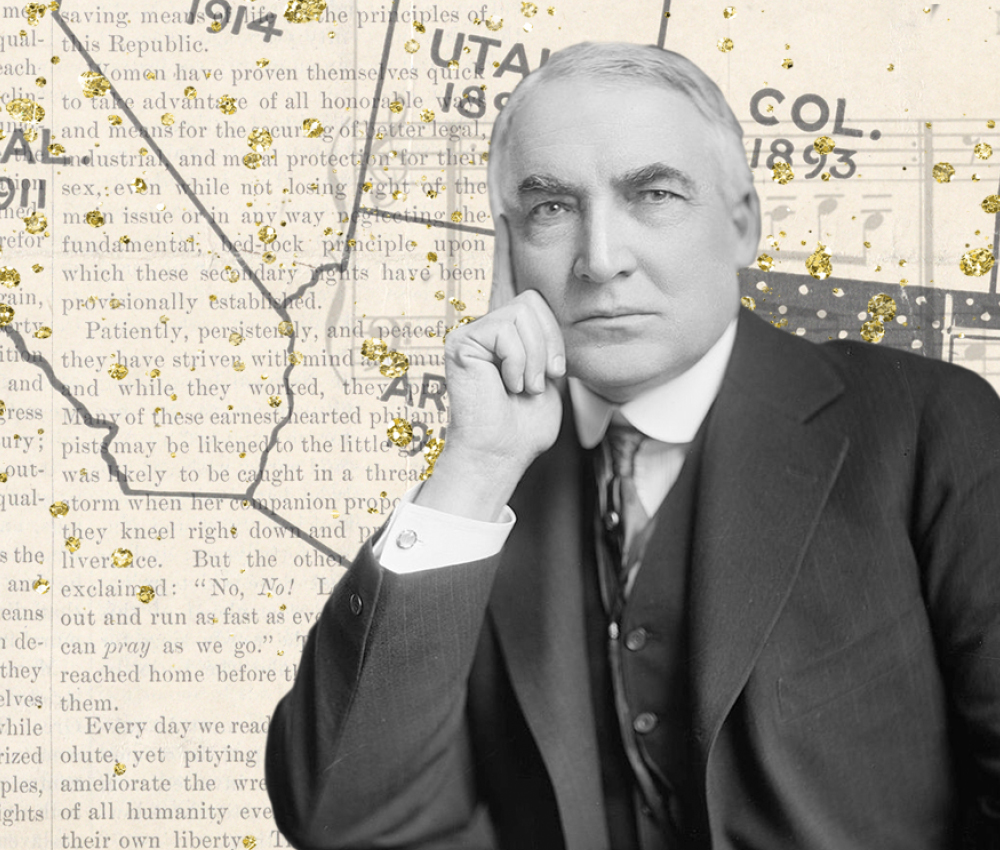
Women from Ohio and neighboring states marched through Marion, Ohio, on Oct. 1, 1920, to hear Sen. Warren G. Harding give a campaign speech from the front porch of his home. Harding was the first president elected after women throughout the United States were allowed to vote in national elections. He ran against another Ohioan, former Gov. James M. Cox of Butler County.
JUDGE TRAPP: To a certain extent, sure. There were still some organizations I met with when I first ran for judge where a man might say, “Isn’t it cute you’re running for judge, honey.”
JUDGE HUFFMAN: My colleague, Judge Barb Gorman, the first woman on our bench, told me that early in her judicial career a few attorneys would refer to her as “girlie.” Today, I get the occasional remark, usually from a criminal defendant, about my gender, but it’s so rare. I haven’t experienced that as an issue of any significance.
JUDGE TORRES-LUGO: There were areas. A group of voters told me they thought more men were needed on municipal court. They argued that women favored other women, especially in domestic violence cases. I wasn’t intimidated and instead viewed it as an intellectual challenge. But, generally, I don’t feel much distinction in how people view male and female candidates in Cleveland.
JUDGE ZAYAS: I think 10 to 20 years ago, women had a much more difficult time running for office. I know, though, that there are some people who won’t vote for me because I’m a woman, and some who will just because I’m a woman.
Being a person of color was more of a challenge. I have a different name and a New York accent. Yet because people notice I’m different, they paused and listened. I think most folks chose who they felt would better serve them. They ultimately considered me for me.
JUDGE COOPERRIDER: I have seven brothers so I know firsthand what it is like to stick up for yourself and to be an underdog. I also knew my abilities as a person, no matter if I was a male or female.
How did it feel when you won your seat for judge?
JUDGE TORRES-LUGO: Oh my goodness, that was a roller coaster of emotions. I didn’t want to look at the TV. I told my family not to tell me anything about the results until it was close to 100 percent. I was excited, humbled, and honored.
JUDGE BALLINGER: I felt a sense of excitement because I could now move forward to create programs and dockets and procedures that would benefit the people who came before me daily. I believed I could make the court more user-friendly and less intimidating. With municipal court being the people’s court serving almost every citizen in the community, it should not be a place that brings on fear or misunderstanding.
JUDGE TRAPP: It was fantastic. As a trial lawyer, I’d won cases and lost. Similarly, I lost my first judicial race, and won my second. It’s perseverance. And election night is a lot like waiting for a jury verdict. When you win, it’s so joyous.
JUDGE HUFFMAN: It was more than humbling. People place their trust in you. I felt the gravity of the responsibility, and the importance of following the law, continuing to educate myself about the law, and treating people with respect.
JUDGE ZAYAS: I still pinch myself every morning: What I do for a living is serve the people as a judge.
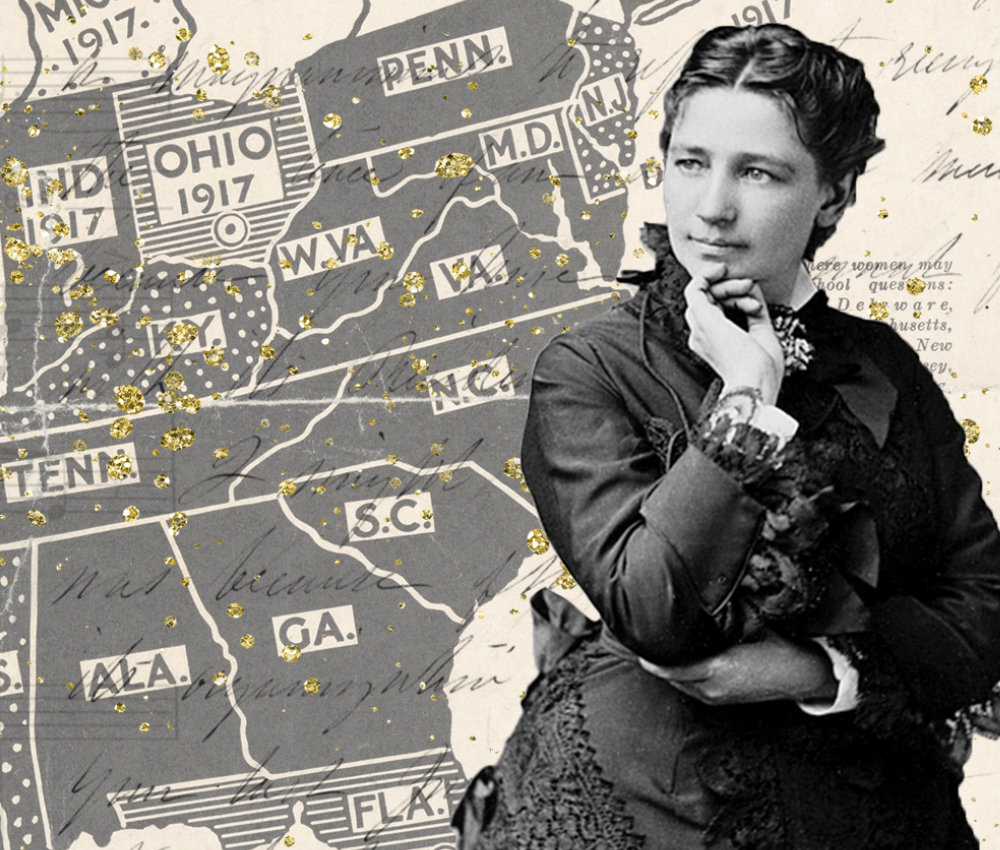
Victoria Woodhull of Homer, Ohio, was the first woman to testify before Congress, arguing for suffrage for women. She was nominated by the Equal Rights Party in 1872 as the first woman to run for U.S. president.
What's the importance of women running for office? What's the importance of women as judges on our courts?
JUDGE BALLINGER: I believe it’s important that women run for office so that we have a more diverse pool of candidates and eventually a more diverse pool of elected officials and community leaders. I don’t believe that women are better leaders than men, but they bring an additional dynamic to the table that benefits all. The diversity strengthens our judiciary and better addresses all of the community.
JUDGE TORRES-LUGO: When you have a child, God rewires you. As a mother, I learned to read people and to step back and find a middle ground. I’ve used these skills as a judge.
JUDGE TRAPP: Women bring a different perspective because of our experiences. We’re a big part of the population, and we bring those perspectives to the table. If women’s voices are heard enough, eventually some of our issues will be heard and addressed.
JUDGE COOPERRIDER: When I ran for judge, I wanted to make a difference in the lives of the people from Perry County, especially the youth. I never made it an issue that I was a woman. I just let them know who I was and what I wanted to do.
JUDGE ZAYAS: It’s great that we’re revisiting this historic moment of women getting the right to vote. It may feel far removed but it’s a great reminder that women put their lives, and everything, on the line for this right. The women had such passion and were fighting for their daughters and nieces. People sacrificed so much.
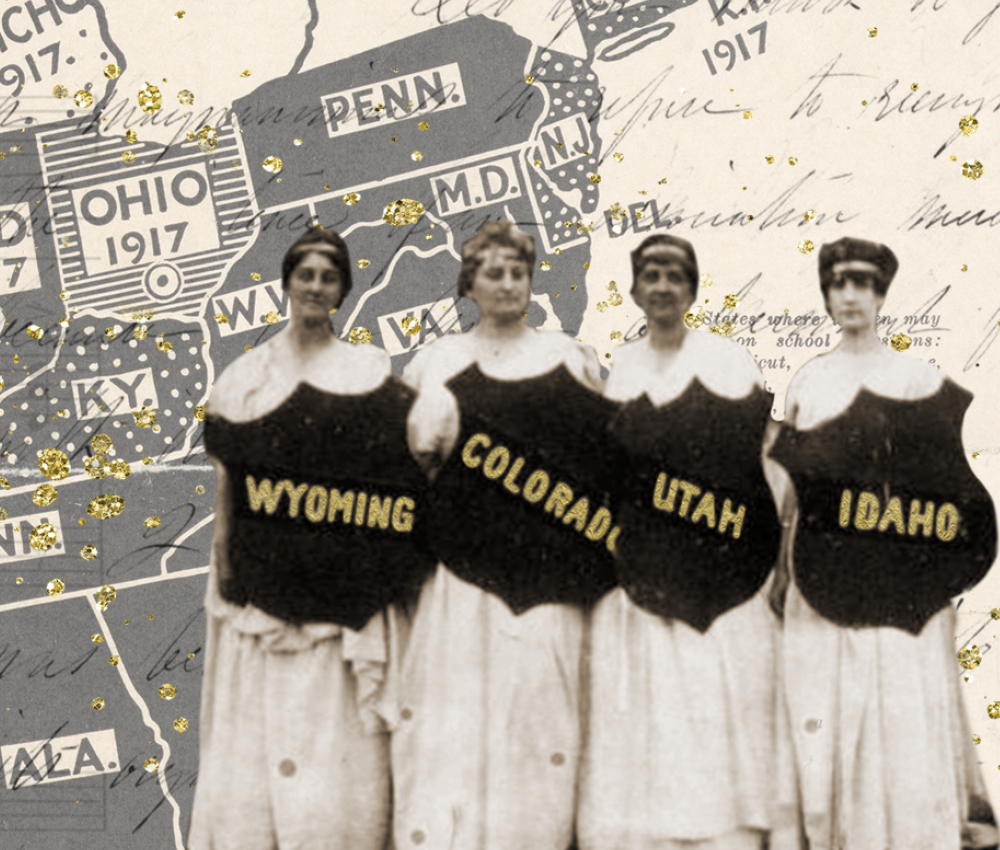
In 1917, Ohio’s legislature passed a law to allow women in the state to vote for president. But a referendum petition put the law to a vote before the public, which repealed it in November of that year.
Why is it important for people to vote or to vote for judges specifically?
JUDGE TORRES-LUGO: You have to understand that all the restrictions in life come from legislation. The legislature can take your life, your liberty, and your property. All aspects of your life are in other people’s hands. You can take control only by voting. If not, you’re at the mercy of another person who doesn’t know you or your values or philosophy.
JUDGE ZAYAS: Elections are won sometimes on a dismal amount of votes. Before provisional votes were counted, a friend of mine was ahead by only four votes on Election Day. Absolutely, believe me, every vote counts. Even when your candidate loses, your vote still matters. Votes showing support for your candidate, even though they lost, encourages others with your values to come forward and run, too.
JUDGE HUFFMAN: In some other countries, the right to vote is non-existent or compromised. I never take it for granted. None of us should squander the right.
JUDGE COOPERRIDER: People should vote to have a say and to be engaged in their local, state, and national government.
JUDGE TRAPP: If you don’t like what you see, you can change it. It goes back to realizing what people went through in this country to gain the right to vote. It’s precious. When I talk to people in other countries, they are in awe of our government. They can’t understand why we wouldn’t vote when we have the chance. Voting is key to our democracy and to maintaining our democracy.
JUDGE ZAYAS: In election years and in between those years, I talk a lot to people about what judges do, what appellate courts do, and the judicial structure in the state. Once they understand, it’s like a light bulb turns on. And they say, “I’m ready, and I want to vote for all those openings.”
JUDGE BALLINGER: Because judges are elected in Ohio, it is important that voters know they are on the ticket and to vote for the best judicial candidate by researching ahead of time. It is beyond me that voters don’t vote the entire ballot!
CREDITS:

